TAFAHI
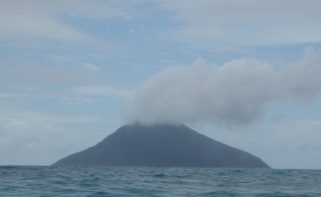
Tafahi sometimes looks like an erupting volcano
Tafahi is a small island – only a few square miles. An estimated 300-400 people live there. These Tongans are unique in that they have been largely isolated from the world beyond Niuatoputapu. Until 1999, their only communication with the outside world was by Morse code with Niuatoputapu. Then phone service was established, but again, it was only with Niuatoputapu. Now, however, the residents will proudly tell you that their telephone (we don’t know if there is more than one) can call anywhere in the world. However, a phone card is needed to call beyond Niuatoputapu, and they are not sold on Tafahi.
There are no roads or vehicles. Although the residents seem to walk along the same routes, there are not even really any definite paths. There are, however, two impressive concrete stairways going up the hillside that must have taken extreme effort to build. There is neither electricity nor plumbing. There is one school which includes grades one through eight, but Tafahi’s children must live on Niuatoputapu if they want to attend high school (many do not). There are no health care providers.
They live simple lives dominated by family, tradition, and religion. They eat from the sea and land, and they have an abundance of native fruits and vegetables.
Our friend, Niko, was born on Tafahi, and he remained there until he moved to Niuatoputapu to attend high school. After high school, he want to Tongatapu, where he met and married Sia, then returned to Niuatoputapu. Most of his family, however, remains on Tafahi, and family members often travel across the 6 mile channel to help one another or visit.
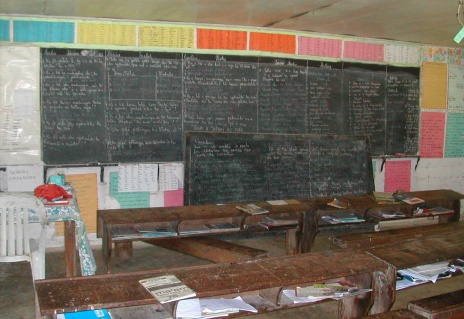
The school looked like it was from another time period
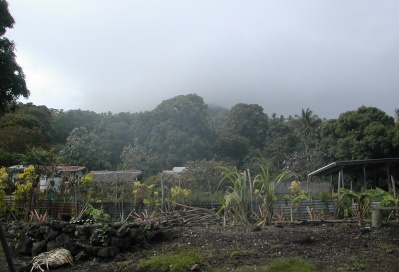
Typical village scene
Niko took us and six other boaters in the anchorage across the channel on a rather dreary and unpleasant day. It was raining, and the channel was rough. Our combined weight was a lot for his 23’ fishing boat with a 40 hp outboard, but he obviously knows these waters well. We arrived wet and salty and glad to be out of the channel.
We were greeted by Niko’s sister, Paki, and cousin, Suanna, and various small children – all related somehow. Neither Paki nor Suanna spoke much English, so we began our visit with some assumed communication limitations. However, with minimal effort we were all able to make ourselves fairly well understood.
We walked through the only village and noticed how rich the soil appears. Food seems to be growing everywhere. The children picked fresh mangos for us as we walked, and they were delicious. We had the opportunity to talk with a few residents whom speak some English, and they were a delight – so friendly and welcoming. We saw some rather spectacular ocean views as we roamed part way up the hill, then we stopped at a particularly charming house to eat, drink, and rest.
This house was built of wood, and it was notable because of how neatly kept the surrounding land was. Flowers and small vegetables were growing in planters, and banana trees went as far as the eye could see. We sat on a platform under a thatch roof, and Nita struck up a conversation with a local women sitting behind us. It was Niko’s mother, and the house we were visiting was their family house that Niko built when he was 16 years old. He cut and milled the lumber with a chainsaw and built the house over a few weeks time.
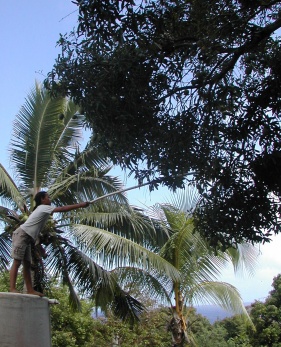
Picking mangos
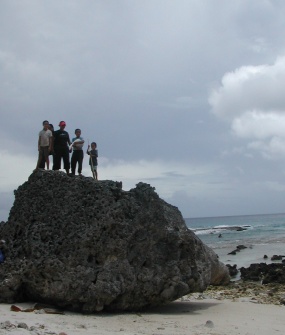
New friends
Nita noticed a man coming down the hillside, and he looked like someone you would expect to see in a travel adventure video. He was a local man, middle-aged, and probably no more than ten pounds over his ideal weight. He wore only a lavalava, and he was balancing a stick across his shoulders from which two hand-woven baskets hung – one on each side. One basket was full of pandanus leaves, and the other contained plantain bananas. As he walked down the hill through the banana trees, Nita realized that she was seeing the Tonga that she came to see. Then we learned that this man was Niko’s father.
But the day was wearing on, and we had gone to Tahafi just for a day’s visit, so it was time to head back. As we worked our way down the hill, our friends/guides picked fresh limes to add to the three bags of fresh mangos they had picked for us. As we were waiting for Niko to pick us up, his father came down the hill, and he came back to Niuatoputapu on the boat with us (including the baskets of pandanus and plantains). Although he doesn’t speak much English, he is quite capable of communicating with non-Tongan speakers, and he is a bit of a character. A very delightful man. Fortunately, the trip back was a bit calmer than the trip over.
We both felt as though we had just had a quick glimpse in to something that we would like to see and experience again. We thought about returning for another day or two, but the weather was quite uncooperative. As it turned out, we did not make it back to Tafahi, but if we ever come back to the Niuas, we will dedicate some time to get to know this charming and interesting island.
Return to our Niuas page.